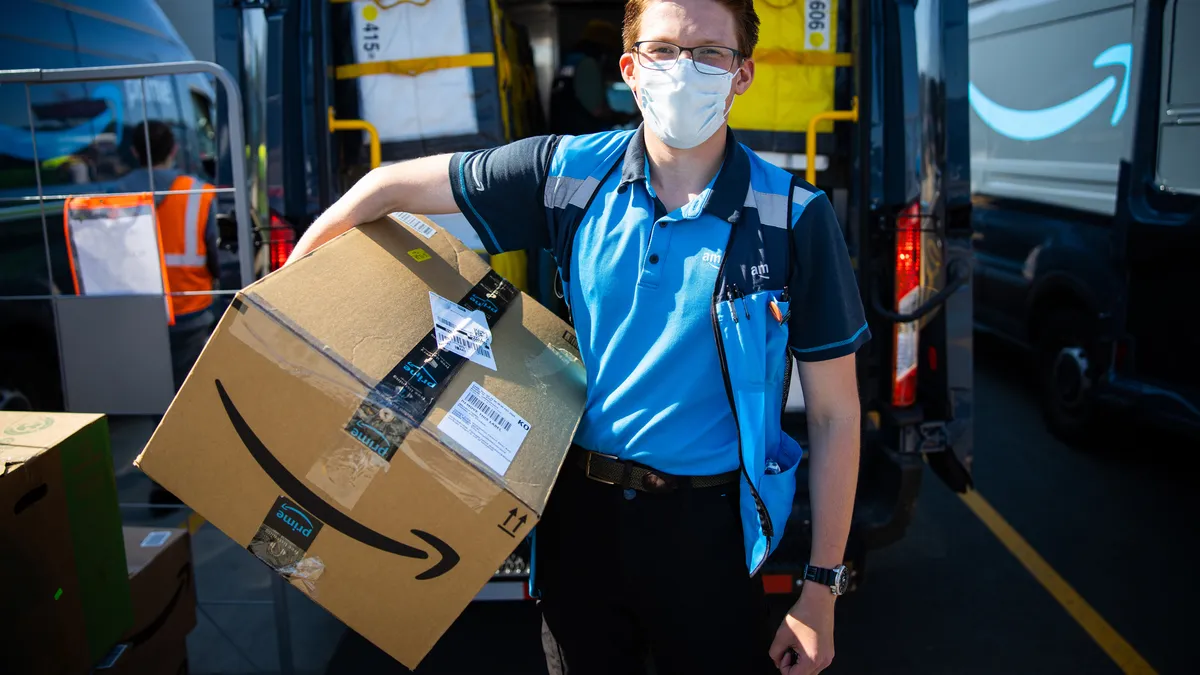Dive Brief:
-
In an all-around blockbuster first quarter, Amazon's own retail operations took a back seat to its marketplace. Online store sales rose 44% to $52.9 billion, with net product sales up 37.4% to $57.5 billion and physical store sales down 16% to $3.9 billion. Including the lucrative AWS cloud business, Amazon net sales soared 44% to $108.5 billion and net income more than tripled to $8.1 billion.
-
Its third-party seller services rose 64% to $23.7 billion, and "other," which the company has said includes advertising, soared 77% to $6.9 billion. Worldwide shipping costs were up 57%, according to a company press release.
-
The company is planning to hold its annual two-day Prime Day sale at some point in the current quarter. July, when the sale is usually held, is prime vacation time and this year the Tokyo Olympics will begin then, two things that could compete with the sale, CFO Brian Olsavsky said on a conference call with analysts.
Dive Insight:
Earlier this month, CEO Jeff Bezos, in his final letter to shareholders before he steps down in the third quarter, noted that Amazon now boasts more than 200 million Prime members worldwide.
That membership has been instrumental in Amazon's position as the e-commerce leader, according to Edward Jones analyst Brian Yarbrough.
"As consumers continue to purchase more online, Amazon appears well positioned to take share from competitors due to its solid reputation for reliability, its popular Prime loyalty program, and its selection and convenience," Yarbrough said in emailed comments. "We expect the stickiness of the Prime membership will help drive growth longer term."
Still, while the e-commerce giant has certainly benefited from the pandemic's fueling of online sales, there are signs that Amazon is feeling the intensity of competition. In his letter, Bezos said that more than 1.9 million small and medium-sized businesses sell through Amazon's website and make up nearly 60% of its retail sales. Growth in its marketplace seller services revenue outpaced its own product sales, noted GlobalData Managing Director Neil Saunders. And online growth at other large retailers is outpacing Amazon's growth, he also said.
"Admittedly, Amazon has a massive business and so every percentage point of growth is worth more than those of other retailers, but, even so, the argument that Amazon is crowding out other players simply does not hold," Saunders said in emailed comments. "Indeed, we believe that the past year has lit a fire under the feet of many traditional retailers which has created a serious boost in investment and energy around digital and omnichannel. Over the medium term, this means Amazon will face more, and not less, competition."
Moreover, Amazon's brick-and-mortar operations count as a weakness, according to Saunders, who called out Kroger, Walmart and Target as all sporting a "major strategic advantage" over Amazon, and deemed Whole Foods Amazon's Achilles' heel.
"[A]s great as [Amazon] is at functional factors such as convenience, operational prowess, technological innovation and so forth, it lacks something of a soul when it comes to creating inspiration and excitement," Saunders also said. "This especially applies to physical spaces but is also evident in the very functional nature of its website and its difficulty in gaining traction in some sectors like luxury fashion. At one level this doesn't matter as Amazon's skills and differentiation is elsewhere. However, that weakness [is] one of the big opportunities for other retailers and, as a retailer like Target shows, focusing on things that Amazon isn't so good at is a recipe for considerable success."
Like most other retailers, Amazon benefited from federal pandemic relief to consumers. Online sales in North America accounted for 35% of its first quarter online sales, so Amazon "gained its fair share of these dollars," according to UBS analyst Michael Lasser. Plus, several analysts noted that the company's international revenue rose 60%.
"The bottom-line is that [Amazon] is emerging from the pandemic in an even stronger position than it was before," Lasser said in emailed comments.















